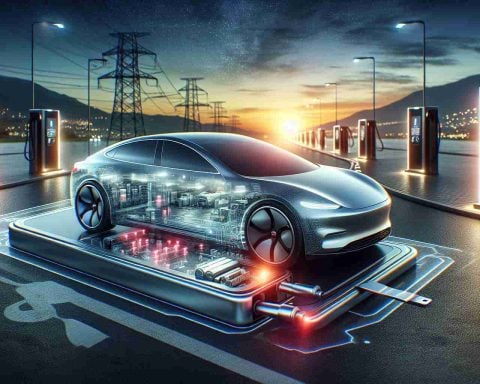- Toyota is establishing a new EV production plant in Shanghai, set to open in 2027 with a target output of 100,000 vehicles annually.
- This facility will be fully owned by Toyota, marking a shift from previous partnerships in China.
- A substantial investment of approximately $14 billion is being made in a new wholly-owned battery plant in North Carolina, expected to create about 5,000 jobs.
- The strategy includes collaboration with the Shanghai government on carbon-neutral initiatives, particularly in battery recycling and reuse.
- Toyota’s commitment to local production and sustainable practices positions Lexus to redefine luxury in the EV market.
Get ready for a seismic shift in the electric vehicle (EV) landscape as Toyota unveils its ambitious plans to turbocharge its luxury brand, Lexus. In a groundbreaking announcement, the automotive giant revealed a brand-new plant in Shanghai dedicated to producing EVs, set to begin operations in 2027 with an initial output of 100,000 vehicles per year—creating around 1,000 jobs in the process.
This move marks a significant departure from Toyota’s previous partnerships in China, as they will fully own and operate this facility. The decision underscores the explosive growth of new energy vehicles (NEVs) within the Chinese market, where local production has become essential to meet rising consumer demand.
But that’s not all! In North Carolina, Toyota is putting the finishing touches on its first-ever wholly-owned battery plant outside Japan. With a staggering investment of approximately $14 billion, this facility aims to create around 5,000 jobs, starting with batteries for hybrid vehicles and eventually expanding to supply EVs.
As part of its strategic “multi-pathway” approach to energy needs, Toyota will also collaborate with the Shanghai government on carbon-neutral initiatives, including battery recycling and reuse.
In a world racing toward electrification, Toyota is not just keeping pace; it’s leading the charge. The key takeaway is clear: With enhanced local production capabilities and a commitment to sustainable practices, Lexus is set to redefine luxury EVs for the modern consumer. Keep your eyes on this automotive titan!
Shifting Gears: Lexus Embraces the Electric Future
The electric vehicle (EV) market is on the brink of transformation with Toyota’s latest announcements related to its luxury brand, Lexus. This article dives into new insights about the upcoming Lexus EV initiatives, industry trends, competitive analysis, and advancements that will shape the future landscape of electric vehicles.
Key Innovations and Features
1. Advanced Technology Integration: Lexus is expected to feature cutting-edge technologies such as AI-driven driver assistance systems, advanced battery management systems, and seamless integration with smart devices to enhance the driving experience.
2. Sustainability Initiatives: Lexus aims to produce EVs using sustainable materials and practices, aligning with global trends toward eco-friendly manufacturing. Their collaboration with the Shanghai government will focus on carbon-neutral initiatives, ensuring the entire lifecycle of the vehicles is environmentally friendly.
3. Customization Options: Anticipated features include personalized vehicle settings and bespoke design options, catering specifically to luxury consumers who value exclusivity and personal touch in their vehicles.
Pricing and Market Forecasts
– Competitive Pricing Strategies: As competition in the luxury EV market heats up, Lexus might adopt an aggressive pricing strategy to attract customers previously loyal to rival brands like Tesla and Audi.
– Market Predictions: Analysts forecast that by 2030, the global luxury EV market could grow to over $300 billion, with brands like Lexus playing a crucial role in this expansion due to their innovative offerings and legacy in the automotive industry.
Use Cases and Consumer Insights
– Target Demographic: Lexus’s EVs are geared toward environmentally conscious consumers who also desire luxury and performance. This demographic is increasingly attracted to the features of EVs, such as lower running costs and sustainability.
– Real-world Applications: Customers will find that Lexus EVs cater to both urban commuting and longer journeys, thanks to enhanced range capabilities that are expected to be competitive with industry leaders.
Limitations and Challenges
– Production Limitations: The new Shanghai plant, while significant, may face challenges such as supply chain disruptions, which could impact production timelines and vehicle availability.
– Consumer Adoption: Although consumer interest in EVs is rising, some luxury consumers may still have reservations regarding the switch from traditional internal combustion engines to fully electric models.
Most Important Related Questions
1. What is Toyota’s long-term vision for Lexus in the EV market?
– Toyota envisions Lexus becoming a leader in the luxury EV segment by leveraging advanced technology, sustainable practices, and localized production to meet growing consumer demand.
2. How does Lexus plan to overcome barriers to EV adoption among traditional luxury car buyers?
– By emphasizing performance, luxury, and innovative features while addressing concerns about charging infrastructure and range, Lexus aims to transition traditional luxury car buyers into EV enthusiasts.
3. What role will sustainability play in Lexus’s future manufacturing processes?
– Sustainability will be at the core of Lexus’s manufacturing, with a focus on reducing carbon footprints, utilizing renewable energy in production, and creating recycling programs for batteries and vehicle components.
Further Exploration
For more information and updates on Lexus’s EV initiatives and other innovations, visit: Toyota. Including insights into their advanced technology collaborations with leading tech firms and sustainability commitments across their vehicle lineup.



















